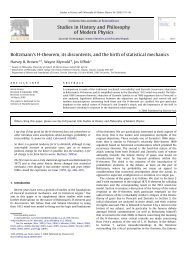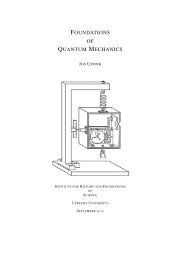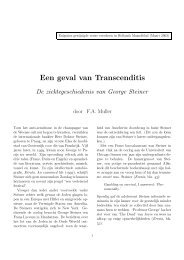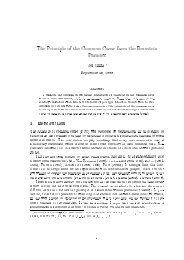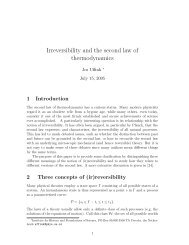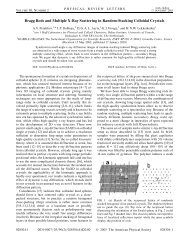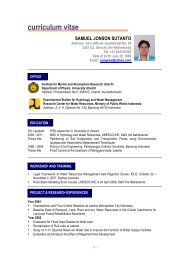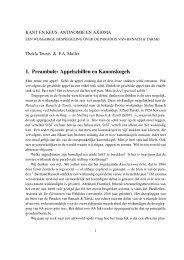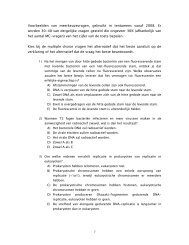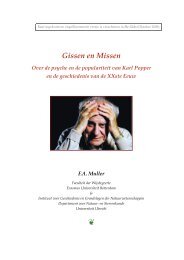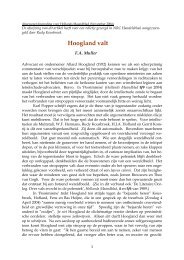Subjective probability and statistical physics
Subjective probability and statistical physics
Subjective probability and statistical physics
Create successful ePaper yourself
Turn your PDF publications into a flip-book with our unique Google optimized e-Paper software.
5 Discussion<br />
The subjective view on <strong>probability</strong> in <strong>statistical</strong> <strong>physics</strong> has often been regarded as<br />
dangerous or unwanted precisely because it would introduce subjective elements in an<br />
otherwise objective scientific theory. Moreover, or so it is argued, such probabilities<br />
would fail to explain why things happen. For example (Popper 1982) argued that it<br />
is absurd to think that our beliefs could explain why molecules interact or why gases<br />
disperse when released into an evacuated chamber. Recently, Albert has echoed<br />
Popper’s concern:<br />
“Can anybody seriously think that our merely being ignorant of the exact<br />
microconditions of thermodynamic systems plays some part in bringing it<br />
about, in making it the case, that (say) milk dissolves in coffee? How could<br />
that be?’ (Albert 2000, 64, original emphasis)<br />
But as argued by (Frigg 2007), the concern is misconceived. Of course, our beliefs or<br />
lack of knowledge do not explain or cause what happens in the real world. Instead, if<br />
we use subjective <strong>probability</strong> in <strong>statistical</strong> <strong>physics</strong>, it will represent our beliefs about<br />
what is the case or expectations about what will be the case. And the results of<br />
such considerations may very well be that we ought to expect gases to disperse, ice<br />
cubes to melt or coffee <strong>and</strong> milk to mix. They do not cause these events, but they<br />
do explain why or when it is reasonable to expect them.<br />
What critics like Popper <strong>and</strong> Albert overlooked is what subjective interpreters<br />
have often been careful to stress: using a subjective interpretation of <strong>probability</strong> in<br />
<strong>statistical</strong> <strong>physics</strong> means that this theory is no longer purely a traditional theory<br />
of <strong>physics</strong> (understood as a description or explanation of physical systems, their<br />
properties, relations <strong>and</strong> dynamics). Rather, it means that one should conceive of the<br />
theory as belonging to the general field of Bernoulli’s “art of conjecturing”, or what<br />
is nowadays called <strong>statistical</strong> inference. That is: it will be a theory about epistemic<br />
judgments in the light of certain evidence. The theory is applied to physical systems,<br />
to be sure, but the probabilities specified do not represent or influence the physical<br />
situation: they only represent our state of mind.<br />
So, in contrast to Popper <strong>and</strong> Albert, I would argue that the subjective view in<br />
<strong>statistical</strong> <strong>physics</strong> is clearly a coherent <strong>and</strong> viable option. This is not to say that it is<br />
without internal problems. As we have seen, Bayes <strong>and</strong> De Finetti differ in whether it<br />
is meaningful to speak of unknown probabilities, while Bayes’ <strong>and</strong> Jaynes’ approach<br />
are hard to reconcile since they model the role of evidence quite differently.<br />
But apart from viability, one might also ask whether a subjective view on <strong>probability</strong><br />
advances the theory of <strong>statistical</strong> <strong>physics</strong> in any way. Does it solve, or help us<br />
solve any problem beter than we would be able to do in an objective interpretation<br />
of <strong>probability</strong>?<br />
There is at least one issue where one might expect the subjective view to be helpful.<br />
In ordinary <strong>statistical</strong> mechanics, i.e. adopting an objective view on <strong>probability</strong>, one<br />
is usually faced by the ergodic problem. That is to say, the question whether or not<br />
the relative time spent by the state of the system in a particular region in phase space<br />
is equal to the microcanonical ensemble average of that same region. The reason why<br />
this question is important in the objective view is that ensemble averages are, on the<br />
one h<strong>and</strong>, relatively easy to compute, but lack a solid objective interpretation, since<br />
19



